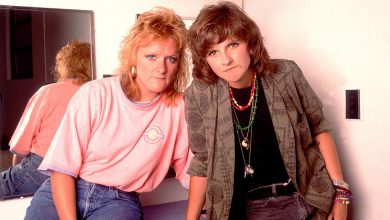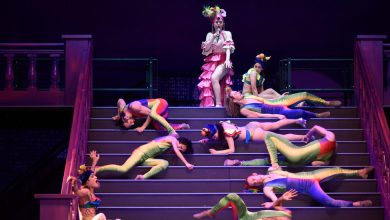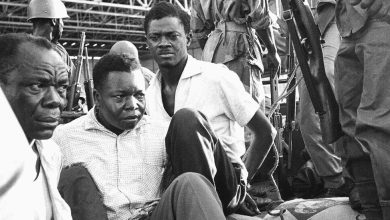Moor Mother’s Musical Galaxy Grows Even Bigger

The poet and musician Camae Ayewa is a study in nonstop movement. On a recent video call from Los Angeles, she chatted while pacing her apartment, stopping to open a few cabinets and pop a Ricola cough drop. “When people hang out with me, we’re not going to be just sitting down and talking the whole time,” she said. “I like creating. It’s my energy.”
Unsurprisingly, Ayewa is an accomplished multitasker. Over the past five years, she’s released a pensive blend of hip-hop, spoken-word poetry, punk and electro under the name Moor Mother — a handful of critically acclaimed solo LPs, two (with another on the way) as a member of the free jazz quintet Irreversible Entanglements, and a joint rap record with the Brooklyn rapper Billy Woods. There’s no telling where she’ll turn up: musing with the British jazz troupe Sons of Kemet, performing with the Art Ensemble of Chicago or onstage with the pianist Vijay Iyer.
“I meet people, then we form some sort of kinship and then something works out,” Ayewa said. The Covid-19 pandemic, however, forced her to tap into a different well for her new album, “Black Encyclopedia of the Air,” which came out last week. Without the face-to-face interaction she prefers, she started working on the album alone in the spring of 2020 as a fun side project to explore traditional hip-hop textures.
Largely produced by Olof Melander (whose beats blend free jazz and electronica), and featuring the rappers maassai, Nappy Nina, Lojii and Pink Siifu, Ayewa’s latest album is one of her most straightforward yet. “Like most people on the East Coast, I started going into this depression,” she explained. (She’s currently teaching composition at the University of Southern California, but spent most of the pandemic in Philadelphia.) “So I would listen to this album, and it became a healing process as I’m working on other things.”
The majority of the Moor Mother catalog is, in a word, intense. Take “The Myth Hold Weight,” from her 2016 album “Analog Fluids of Sonic Black Holes.” “We want our money back/printed on fresh cotton and a glass of blood from the Confederate fountain/that run through the Blue Ridge Mountains,” she speaks over a track of weightless bleeps and bloops that sounds like a spaceship landing. It can sometimes seem like Ayewa inhabits her own universe. (When asked how old she is, she replied, “I don’t believe in age.”)
Iyer, who collaborated with Ayewa for a gig in Prospect Park in August, said her lyrics are “so eclectic, so vast, so deep, so cutting.”
“Everything about it,” he continued, “the sound artist side, the hip-hop side, the spontaneous poetry, the collaboration and community, the imagination that expands beyond, all of that together continues to be super exciting to follow and to be a part of her world in a small way.”
Some of Ayewa’s earliest musical memories include listening to gospel as a child growing up in Aberdeen, Md. Her father sang in the church choir and she eventually followed suit, until she quit to start practicing taekwondo.
She smiled widely talking about her first love — basketball — which she got into after her sister Paulette became a star player at North Carolina A&T. “Then I found out about Bob Marley,” she said through a grin. “I started to be a little more creative, like ‘maybe I want to be an artist.’” She started listening to hip-hop; the rappers MC Lyte and Da Brat are among her favorites.
“Hip-hop was so cool,” Ayewa said. “There were so many different artists in so many different boxes, not just one type of look.”
When Ayewa moved to Philadelphia to study photography at the Art Institute, she started a rap duo with her best friend, Rebecca Roe, called the Mighty Paradocs, that soon morphed into a punk band — “a Rage Against the Machine meets Bad Brains kind of group,” Ayewa said — with political lyrics and brash instrumentation. That led to a monthly concert series called Rockers!, a spot for like-minded musicians who made esoteric art that didn’t fit into a particular space. The shows ran for more than a decade. Along the way, Ayewa started or was a part of a number of bands or collectives, each representing different aspects of her artistry: Girls Dressed as Girls, a lo-fi punk outfit; Black Quantum Futurism, a multidisciplinary duo with the author Rasheedah Phillips.
In 2015, Ayewa joined the saxophonist Keir Neuringer and the bassist Luke Stewart to play the Musicians Against Police Brutality rally, which was organized following the killing of Akai Gurley, an unarmed Black man, in East New York. They met the trumpeter Aquiles Navarro and the drummer Tcheser Holmes there, and soon entered a Brooklyn recording studio as a group. The resulting album, “Irreversible Entanglements” (also the name of the project), was a combative free jazz set that scolded police, racism, capitalism and politics.
“We each had a few different ideas, but ultimately the first thing we did was start playing,” Stewart said. The LP arrived in 2017 amid heightened awareness surrounding the deaths of unarmed Black people. In turn, Ayewa’s lyrics pulled no punches. “She brings the intensity in her vocal delivery on a bare bones musicality level,” Stewart added. “The sound and timbre of her voice lends itself well to this sort of situation. Watching her movements as an artist and community organizer, I think she is coming from a very profound place.”
The collective’s third album, “Open the Gates,” is due Nov. 12. While it has all the fire of its first two releases, it’s meant to forge a way forward from the rage. Ayewa had been studying books on Tai Chi as a way to de-stress in the throes of the pandemic and decided to carry the practice into her writing for the group’s new record. “We walked in with the intention of a meditation,” she said.
As for her own album, “Black Encyclopedia of the Air,” Ayewa said it was time to come down to earth a little bit, to put forth a more direct project that didn’t sacrifice complexity. “I want it to be accessible so you can play it when you’re hanging out with your mom or little sister,” she said. “You can still get the message but it’s not over your head, you know? The feelings are still there.”





